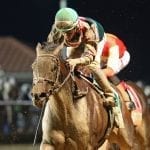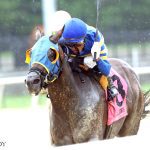For trainer Lynn Cash, “the time of our lives”
It’s a well-worn path, indeed, for many who entered racing later in life: achieve success elsewhere and buy into a horse or three (or a dozen or two, depending on financial wherewithal) as a hobby.
Norman Lynn Cash achieved the requisite success – as a self-described “storm-chasing roofing contractor” – but then took a different route.
“My sister says, ‘You’ve never dipped a toe in a swimming pool in your life,’” Cash said. “’If it looks good, you run and jump in and then you figure out how to swim.’”
So it is that Cash finds himself at 59 a relatively newly licensed trainer with 32 stalls at Laurel Park in Maryland and 27 at Kentucky’s Thoroughbred Training Center, and 10 horses entered on Saturday’s Laurel card. That includes three of the eight scheduled runners in the Grade 3 General George and three of 10 in the John B. Campbell Stakes. All of his horses are owned by his family’s Built Wright Stables, LLC.
Cash caught the racing bug as a youngster in New Mexico.
“The horse racing that I saw was when I would sneak away when I was in high school and go to the State Fair in Albuquerque and play the ponies,” he remembered.
But life took him in other directions and, as we all do, he put aside childish things. He started his family business, Built Wright Homes and Roofing, in Colorado in 1995. Ten years later, he won a contract with the Federal Emergency Management Agency assisting victims of Hurricane Katrina with temporary housing. That led the company to focus on providing roofing and other services to homeowners whose homes have been damaged by storms and other natural disasters.
In 2012, Cash attended, as a fan, all three legs of the Triple Crown as I’ll Have Another won the Kentucky Derby and Preakness but saw his bid for immortality dashed by injury prior to the Belmont Stakes. I’ll Have Another’s background got Cash thinking.
“It came out that he had been a horse that was bought for $35,000 at auction,” Cash said. “We’re there, and I’m telling my wife [Lola], ‘Man, wouldn’t it be fun to own a racehorse.’”
The couple bought a couple of horses, in fact, including Mal Guapo, who went on to win 16 races; Take It Like a Man, who earned over $400,000; and Speightswright, who never made it to the track. It wasn’t a profitable racing foray, but it was an informative one.
“We were owners for six or seven years,” Cash said. “I tell people that I got a million-dollar education with those three or four horses.”

But, perhaps characteristically, Cash took away a different lesson than the one most in the industry learn.
“I told my wife Lola, you know, I think with a couple of small changes, we could make a living at this,” he said.
Among the changes: Cash would take out his trainer’s license and train the family’s horses himself. They would obtain their horses via the claimbox rather than at auction. And the one most people have observed thus far in his brief career: he would run them more frequently than most modern trainers do.
In 2022 Cash’s starters made an average of more than 7.5 starts. No other trainer in the top 100 by earnings reached even 6.3 starts, and national earnings leader Chad Brown’s horses made fewer than three starts each during the year on average.
Most famously, Cash sent out the hard-hitting starter allowance runner Beverly Park 30 times in 2022. The Munnings horse won 15 of those and has won his only start to date this year.
“He’s a tank and can stand up to the wear,” Cash said admiringly of Beverly Park.
Cash said that he has backed off that aggressive approach somewhat this year, though he is once again tops among trainers in starts per starter.
“Maybe I’ve realized that I could take the bullets that I’m shooting and get them a little more precise and pinpointed if the horses had four or five more days’ rest instead of running them back quick-quick,” he explained. “It doesn’t bother me to run one on seven or eight days’ rest, but now we’re trying to push it to about a two-week stretch. Still not the four- or five-week industry standard, but we find that they’re a little fresher, and the numbers [win percentage, earnings, etc.] might come up.”
So far, the change in approach seems to be working. While Cash trainees won at a 14% clip last year and finished in the money 42% of the time, this year he’s scoring 16% of the time and finishing in the money 48% of the time.
But Cash said the biggest tweak in approach, outside of training them himself, has been how he obtains horses. He’s had particularly good success claiming horses perhaps a bit more expensive than the norm in the Mid-Atlantic.
For example, all seven of his Laurel Park stakes runners on Saturday came to him as claims. He paid between $35,000 and $62,000 for each, with three coming from second-level allowance/optional claimers and a fourth from a third allowance/optional claimer.
He paid $40,000 to obtain Double Crown, a Maryland-bred son of Bourbon Courage, and that runner subsequently won last year’s Grade 2 Kelso at Aqueduct for the trainer’s first and to date only graded victory. He gave $40,000 to claim Plot the Dots in October; he won the Jennings two starts back. They will square off in the John B. Campbell Stakes Saturday.
And in last summer’s $250,000 Russell Road Stakes at Charles Town, Cash ran one-two with $62,500 claim Sir Alfred James and $35,000 claim Eastern Bay, respectively. Both are entered in Saturday’s Grade 3 General George.
“It just seems like, when you’re buying at auction, you’re buying on hopes and dreams,” Cash said. “After they’ve run a few times, you can claim them for what they’re worth.”
Many of the horses Cash has taken were well-regarded youngsters that, in some cases, took a while to come to hand. But he’s the one benefiting now.
“I’ve got a whole barn full of quarter-million and above horses that we claimed,” he said. “It makes sense that some of these horses eventually grow into their bodies and come on strong.”
Even where Cash runs demonstrates his different approach. While most owners and trainers prefer to run close to home, the Midway, KY relative shops around for spots with good money and manageable competition. He avoids, he says, racing at Turfway Park, where the competition is tough and fields large. The Mid-Atlantic – with good purses, more modest competition than Kentucky, and many nearby racetracks – provides a perfect launch pad for him.
Which isn’t to say it’s been an entirely smooth ride for Cash and his operation. He tried his luck at Oaklawn Park in 2021-22, for example, and, without good enough stock, won just four times in 45 starts. And last year a horse of his named Matt’s Honey came back with a methamphetamine positive after a race at Churchill Downs. It was an apparent case of contamination, Cash said, and remains the only medication violation on his record.
“I had to try to figure out what documents you need track-to-track,” Cash said of his early days as a trainer, adding with a laugh, “Sometimes I’ve even circled the racetrack because I couldn’t find the stable gate. I don’t know if it’s a strength or a weakness, but a lot of this has been through trial and error.”
Cash took out his trainer’s license in 2021. In 2022, he won six stakes races, including the graded score, and he has added one more stakes win so far this year. Soon he’ll reach 1,000 starts – he’s at 855 now –and has a bevy of horses in his barn that are competitive in stakes company. He has a farm in Midway, KY, where two sons also live, and horses in Kentucky and Maryland.
All in all, it’s pretty heady stuff for a guy who didn’t train a horse until he was in his mid-50s.
“Two years ago, I would never have dreamed this. I didn’t have the guts to dream it would be like this,” he said. “We’re having the time of our lives here.”
LATEST NEWS

















His success is inspiring and I hope
it continues,we need new blood in the game.